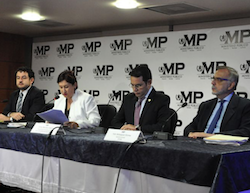Authorities in Guatemala have accused jailed former President Otto Pérez Molina and his vice president in yet another illegal scheme, pointing to the depth and breadth of political corruption in the country’s previous presidential administration.
The United Nations-backed International Commission against Impunity in Guatemala (Comisión Internacional Contra la Impunidad en Guatemala – CICIG) and the Guatemalan Attorney General’s Office announced charges related to a massive illegal campaign finance network in a June 2 press release. More than two dozen suspects have been arrested, and several international arrest warrants have been issued in connection with the case.
According to an internationally supported investigation, Pérez Molina began the illicit campaign finance scheme after his losing presidential bid of 2007. From 2008 until the 2011 election, Pérez Molina and his soon-to-be vice president, Roxana Baldetti, allegedly created a network of companies headed by front men which laundered illicit campaign payments from businesses and individuals.
After Pérez Molina and Baldetti won the 2011 election, the investigation found, those who provided the illicit campaign funds were rewarded with favors from governmental entities. The investigation linked at least 450 state contracts to the criminal structure, and found that the illicit campaign financing amounted to at least 500 million quetzals, or about US$65.5 million.
Guatemalan authorities have previously tied Pérez Molina and Baldetti to two other major corruption schemes. One of these plots, known as “La Linea,” involved companies paying bribes to customs officials in exchange for help avoiding import taxes. The other scandal involved allegations that Pérez Molina accepted bribes from a Spanish company in exchange for steering a major port development contract toward that firm.
InSight Crime Analysis
In addition to Pérez Molina and Baldetti, the illegal campaign finance network included several individuals whose names have also surfaced in connection with the other corruption investigations mentioned above. The new allegations against the former president and former vice-president suggest that they were not only personally involved in corrupt acts, but also that, in CICIG’s words, they led a “criminal mafia structure that had co-opted power through the ballot box in Guatemala.”
SEE ALSO: Coverage of Elites and Organized Crime
The anti-corruption actions undertaken by CICIG and the Attorney General’s Office have landed Pérez Molina and Baldetti in jail, and it appears that their criminal networks have been largely dismantled. But while the ongoing investigation and prosecution of suspects linked to political corruption during the previous presidential administration serve as signs of progress, Guatemala will undoubtedly face many challenges — including financial constraints and judicial corruption — as the country continues its fight against graft in the future.

